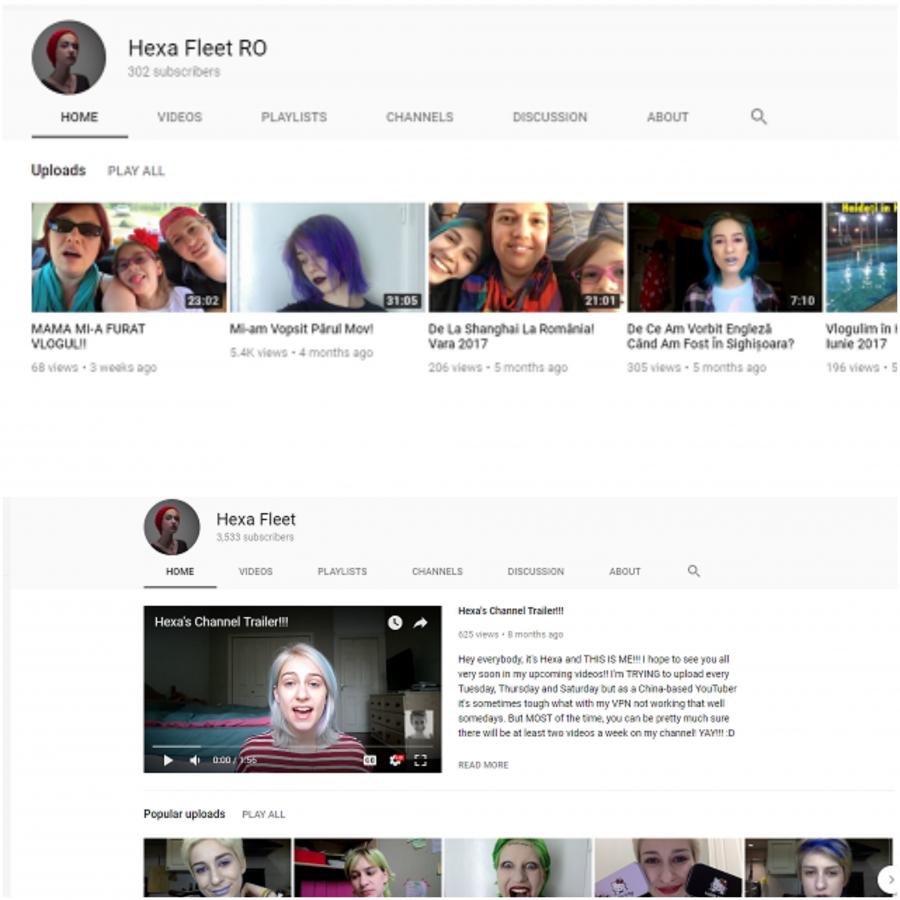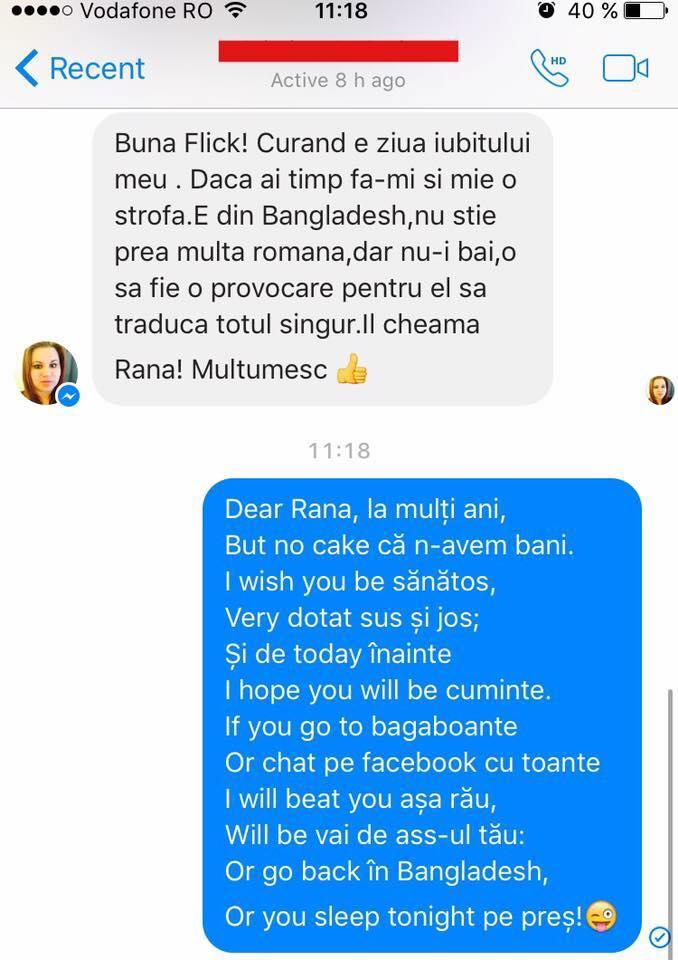
Do you know what Romglish is?
The use of English goes hand in hand with contemporary globalization. English has become the primary language used for international communication in a world that is deeply wired. How did this happen? English started to become important and valuable due to the United States being the most successful global super power. People speak English either because it is their mother tongue or because they have learned it due to the high demand imposed upon them by the globalized world.
Take some of the most common international areas - airports. It is easily noticeable that English is spoken as a lingua franca there and, because of its global spread and accesibility, it is assumed that all passengers will understand it. The spread of English in the context of globalization gave rise to a new phenomenon called Englishization, i.e. different cultures exerting their own influence on the English language, adapting it through a filter that consists of their own culture, accent and even language.
In this paper I will analyze one specific example of Englishization, which is "Romglish", a linguistic process that is currently evolving in Romania.
Romglish
"Romglish" refers to a mix of Romanian and English linguistic features. The phenomenon revolves around teenagers who speak a language that is half-Romanian and half-English, the creation of half-Romanian and half-English poetry, and the growing popularity of T-shirts with Romanian sayings that are translated and adapted to English to make them seem funny. I will discuss these examples in more detail further on.
To give you an idea of how Romglish sounds I will present some common constructions. The Romglish phrase "you're dust'' relates to the Romanian saying "Eşti praf", which indirectly means "you suck". Translated literally to English, it would be "you're dust". This translation is used as a joke by Romanians and a lot of people can be spotted wearing T-shirts with funny expressions like this in Bucharest. Another example is the usage in Romanian mainstream media of English words that are adapted and modified to make them sound Romanian, such as "share-uit", which comes from the English word "share" and is then adapted with the Romanian suffix "-uit" that defines action.
Such adaptations occur frequently due to the fact that translating an English word to Romanian would require more than one word in Romanian (sometimes it takes around three words in Romanian to translate one English word), which obviously takes more time and effort. Hence, Romanians prefer the English terms. A term like this is "weekend", which translated to Romanian is "sfârşit de săptămână". Usually people prefer "weekend" over the Romanian version. The video below contains an example of a conversation in Romglish.
A bit of history
How did it all start? Romanian linguists believe that the phenomenon of mixing Romanian with English started to occur after the fall of the communist block in 1989, opening Romania to Western society and making it more globalized. As Ruxandra Vişan, professor at the University of Bucharest, writes in an article:
"Among the developments associated with globalisation is the use of English in a growing number of institutional domains. A heightening of the Romanians' familiarity with global English has taken place, English loanwords and code-mixing making their way into Romanians' language use." (Vişan,2016,p. 137)
The label "Romglish/Romgleză" was coined by the Romanian linguist Eugen Simion in the late 1990s. In a newspaper article published in 2001, Simion depicted Romglish as an "intolerable jargon which tends to spread like scabies and to stupify language, to uglify it" (my translation of the Romanian "jargon intolerabil care tinde să se împrăştie ca râia şi să prostească,să urâţească limba"; Simion, 2001). At first, Romglish was seen as a threat to standard Romanian (see below). Another factor that influenced and boosted the creation of Romglish is the Internet. Due to the birth of the Internet and its global spread, Romanian teenagers got access to American and British culture, which influenced the way they talk and also the way they behave. As Manuel Castells points out: "Interactive computer networks are (...) shaping life and are being shaped by life at the same time" (Castells, 2012, p. 2).
The role of the Internet
The Internet is a predominantly English-language space. As sociologist Claudia Ghisoiu stated on Radio Romania International:
"About 85% of the information found on the Internet is in English, and this is an effect of globalization. That is why around 1.5 billion people throughout the world speak English, at a certain level. In order to navigate on the Internet one needs to understand English."
Let's look at social networking sites like Instagram, where most of the information is in English because the community of photographers and people who share their pictures want to be understood by a large audience. The only way for them to do so is to express themselves in English. Another good example would be an online video game like Overwatch, where you play in a team. To be able to complete your objectives, communication is essential, and the language used will definitely be English. Obviously, Instagram and Overwatch are both American products, and it is well known that the most successful social networking sites belong to American corporations like Facebook, Twitter and Google. The same applies to the gaming industry, in which Electronic Arts and Blizzard are globally famous names. The Overwatch game community connects about 30 million players from all over the world and to make this community strong, English is used as a lingua franca.
To zoom in, imagine a Romanian teenager who plays Overwatch. He or she will become more accustomed to Anglo-Saxon lifestyles by communicating in English with other Overwatch players and by playing this game everyday, the Romanian teenager ends up speaking English on a daily basis.
The influence of the Internet and of globalization in Romania isn't only a matter of language, but also of culture
The influence of the Internet and of globalization in Romania isn't only a matter of language, but also of culture. Romanians who spend their time on the Internet will assimilate not only English language skills but also cultural aspects from the American and British cultures. For example, Romanian youths prefer Valentine's Day over the Romanian equivalent of "Dragobete" mostly because the American Valentine's Day is more popular. It can be found online easily, and it is obvious that #ValentinesDay on Instagram is more trending than #Dragobete.
Another aspect is that more and more Romanians are becoming active on YouTube, adopting the trend of vlogging that started in the West. One can easily find English-speaking Romanian vloggers who use the same methods as American vloggers. A Romanian vlogger who does so is Hexa Fleet. Her YouTube channel is mostly about music, make-up and healthcare, and the content she makes is in English. This might be because firstly YouTube is an American brand and English is the most predominant language and secondly because in order to be able to reach more people on this platform, one needs to speak English. If Hexa Fleet spoke exclusively in Romanian she would end up only having a Romanian audience that would be smaller than her current one, acquired while speaking in English. Her international YouTube channel has over 3000 subscribers, whilst the exclusively Romanian channel only has 300 subscribers.
Going back to the video game mentioned earlier, Overwatch, our Romanian teenager who plays Overwatch can easily get influenced because Overwatch is an American game and it promotes American concepts such as holidays like Halloween, a holiday that is actually gaining popularity in Romania as well.

Hexa Fleet's YouTube Channel
Transnational culture scapes
Conversely, Romanian language and cultural aspects are also added to the imported language and cultural phenomena. This is where it gets interesting. We can see in present-day Romania how global scapes are adapted locally. As Arjun Appadurai explains in his book "Modernity at Large", globalization creates transnational scapes (Appadurai, 2010). Let's have a look at locally adapted global scapes in Romania. A good instance would be the McDonald's limited edition of "McMici", a dish consisting of the Romanian traditional "mici", which are barbecued tiny sausages made of minced meat, combined with the standard hamburger in the menu of the famous American food chain.
McDonald's McMici
We can find other examples of global scapes that are locally adapted, for instance within the Romglish fashion collection by Ruvix, a store located in Bucharest, the capital of Romania. This collection consists of T-shirts with Romanian sayings that are translated to English to give them a funny taste. For instance, the Romanian saying "freacă menta" means that someone is wasting time by not doing anything. Translated literally into English, it goes "to rub the mint", and this is one of the prints used by Ruvix on their T-shirts. Posts on Ruvix's Facebook page show that this Romglish/Romgleza collection is seen as funny-to-wear clothing, and this might be amusing because of the simple fact that everyone who speaks English can read it but in order to understand it you have to understand Romanian. Wearing such clothes is perceived as "cool" among youths in Romania, it is a sign of being "open" to Western Civilization.
Rubbing the Mint
Poetry
Another contemporary Romglish phenomenon is the half-Romanian and half-English poetry trend. Flick Domnul Rimă, a very famous radio and Internet celebrity, periodically posts poetry on his Facebook page. Flick is a Romanian artist whose talent is to compose rhymed poetry. The interesting aspect is that he can make rhymes between Romanian and English words, mixing the two languages very well. The following example of such rhymes is taken from his Facebook page: "Sorry, I was nesimţit/ Că I came nepregătit..." (which translates to: "Sorry for being an asshole/That I came unprepared."). His audience is quite big and consists not solely of youths, which means that actually more and more people in Romania understand English at the moment, which is clearly an effect of the Internet and also of the globalization growing in Romania.
Romglish Poetry
Romanian under threat ?
Even though Romglish is commonly used in everyday talk, Academia in Romania isn't fond of Romglish. It is mostly seen as a way of breaking and mangling the standard Romanian language, something that made people ask themselves if this might lead to the death of standard Romanian in the future. Linguist Marius Sala gave an interview in 2014 for the popular cultural magazine "Cultura", saying that: "You are cool if you speak correctly in Romanian too" (my translation from "Eşti cool şi dacă vorbeşti corect româneşte")(Crişciu, 2014).
Marius Sala is not the only intellectual who holds this belief. Linguist Rodica Zafiu from the University of Bucharest was asked in an interview if contemporary Anglicisms bothered her and her reply was affirmative: "Of course I am bothered by some. Any new element in a language, especially when it is redundantly employed where an already existing one could have been used, is bothersome" (Ofiţeru, 2015; translated by Ruxandra Vişan). According to Zafiu, there is no point in using and borrowing linguistic aspects from English when we can use the Romanian equivalent that already exists in the Romanian language. It is different when people borrow words that can't really be translated into Romanian, these are acceptable cases.
Even though Romglish is commonly used in everyday talk, Academia in Romania isn't fond of Romglish
Will Romanian slowly be degraded and changed into a hybrid between English and Romanian? The answer given by academians is definitely no. When asked if he believes that a rejuvenation of the Romanian language is possible, Sala's reply was:
"The massive borrowing from American English is, as I've already underlined, just a passing fashion, many of these borrowings will disappear because language has a wisdom of its own, it keeps the words and phrases it really needs." (Crişciu, 2014; translated by Ruxandra Vişan)
Therefore, Romanian is not actually threatened by Englishization and the occurence of Romglish might just end up being a passing phase. Even so, in present-day Romania we must admit that Romglish is real and that it makes the newer generations more prone to combining Romanian with English. On the other hand, it is not only language that has changed in Romania, due to globalization we also see more and more American trends making it across the ocean, to Romania.
Romglish, globalization and the internet
Globalization and the rise of the Internet, which is the current main globalizing infrastructure, are the primary factors that have made worldwide Englishization possible. It doesn't mean that Englishization is here to stay, it might just disappear as quickly as it emerged. The topic discussed in this article - Romglish - is a great example of the Englishization phenomenon that, according to academics, might be just a trend. Furthermore, because Romania was communist before the 1990s, it is no coincidence that Romglish appeared after the communist regime fell. Actually, this is the main proof that globalization has something to do with it, because the end of zoning and the opening of borders between West and East made Romania open to globalization processes. To sum up, Romglish is an effect of a globalized Romania that emerged with the end of zoning, and that is rapidly changing the way Romanians talk and possibly the Romanian language, which abounds with neologisms.
References
Appadurai, A. (2010). Modernity at large: cultural dimensions of globalization. Minneapolis: Univ. of Minnesota Press.
Castells, M. (2012). The rise of the network society: second edition, with a new preface. p. 2. Malden, MA: Wiley-Blackwell.
Crișciu, T. (2014). “Esti cool si daca vorbesti corect romaneste.” Cultura 466, May 9/2015 [Online]. [Accessed 18 Nov 2017].
Ofițeru, A. (2015). “Noua limbă a românilor. Lingvista Rodica Zafiu explică în interviurile Gândul cum am ajuns să vorbim și să înjurăm ROMGLISH.” Gândul, March 1/2015 [Online]. [Accessed 18 nov 2017].
Radio Romania International. (2017). Radio Romania International - Romglish and its Users. [online] Available at: http://www.rri.ro/en_gb/romglish_and_its_users-10302 [Accessed 18 Nov. 2017].
Simion, E. (2001). “Tot despre „romgleză.” Curentul, June 6/2001, p. 3(1).
Vișan, R. (2016). Linguists, Romglish and “Verbal Hygiene”. Romanian Journal of English Studies. p. 137. 13(1). doi:10.1515/rjes-2016-0017